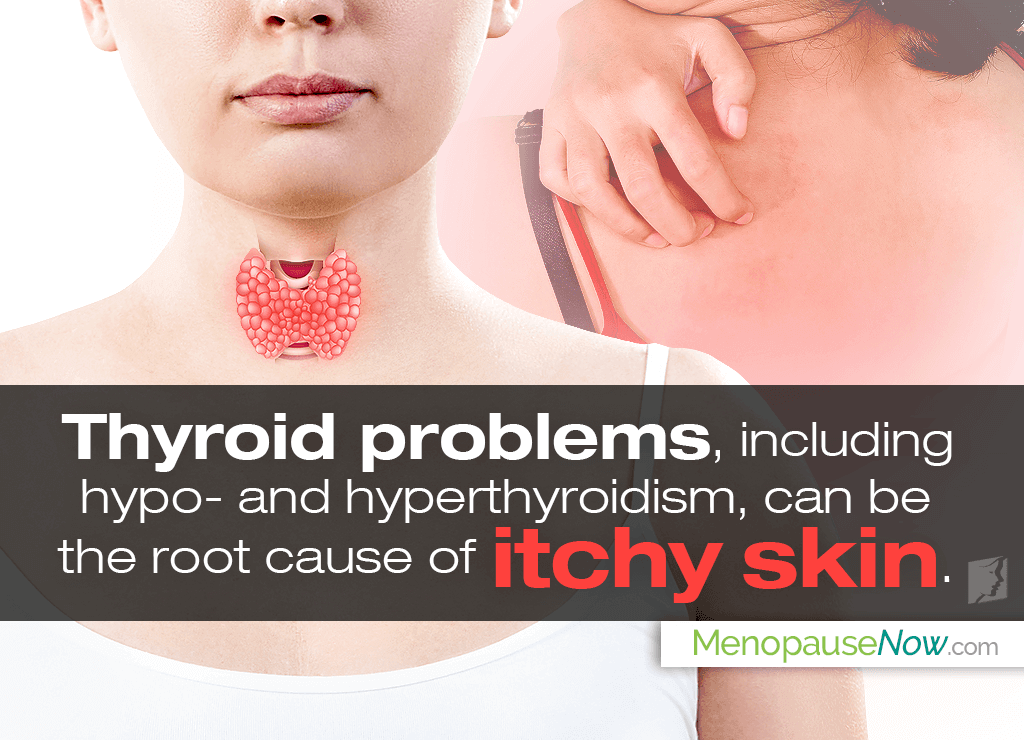Thyroid problems can be most commonly caused by either an overactive thyroid gland (hyperthyroidism) or an underactive thyroid (hypothyroidism), both of which can provoke a variety of symptoms, including dry, itchy skin.
Continue reading to discover the relationship between your thyroid and itchy skin as well as the best ways to tackle this pesky symptom with ease.
About Thyroid Function
Thyroid function is closely related to metabolism. The thyroid gland also helps to maintain blood pressure, regulate tissue growth, and encourage the development of the skeletal, nervous, and reproductive systems.
The thyroid gland also has direct and indirect effects on skin, including regulating its growth and repair mechanism.1
About Itchy Skin
Itchy skin, medically known as pruritus, is defined as an uncomfortable sensation, followed by an urge to scratch.
While aging is one of the most common factors contributing to itchy skin, the condition can also have a number of other causes, including allergies, psoriasis, eczema, liver disease, diabetes, and thyroid disease, among others.
The Link
Abnormal thyroid function, including hyper- and hypothyroidism, can lead to dermatological problems, including dryness and itchiness.
An underactive thyroid causes the body's metabolic rate and blood circulation to decrease, thus affecting the skin's ability to grow and repair itself as it should. On the other hand, an overactive thyroid gland increases blood flow to the skin, resulting in itchiness.
Common skin-related symptoms of thyroid problems include:2,3
- Dry, itchy skin
- Paleness
- Coarse, scaly skin
- Rash or hives
- Yellow discoloration on the palms and soles
- Swelling and redness
- Excessive or decreased sweating
- Moist, smooth, and warm skin
Treatment Options
If you think you are suffering from a thyroid problem, you should see a doctor as he or she can prescribe proper treatment relative to your condition.
Taking medications to balance hormones
Standard treatment for hypothyroidism involves taking an oral medication of a synthetic thyroid hormone to restore balance, while hyperthyroidism involves taking anti-thyroid medications that prevent the gland from producing excess hormones.
Keeping an active lifestyle
Maintaining a healthy and active lifestyle can help restore hormone levels and boost energy. Exercising for 30 minutes at least five times a week can be beneficial for reducing stress, improving mood, deepening sleep, and increasing energy levels.
Eating a healthy and balanced diet
Proper nutrition is also important for promoting skin health. Opt for foods to relieve dry, itchy skin, while composing your daily diet with plenty of protein, complex carbohydrates, and healthy fats.
Relieving itchy skin with natural moisturizers
Whether you prefer store-bought lotions for itchy skin or natural oils for dryness, they can bring quick and lasting relief, while giving the skin proper hydration.
Conclusions
While itchy skin is a less common symptom of thyroid problems, it calls for prompt treatment aimed at balancing hormone levels, improving a woman's quality of life, and preventing complications. Click on the following link for more information on natural and effective itchy skin treatments for a symptom-free life!
Sources
- American Thyroid Association. (n.d.). Hypothyroidism. Retrieved January 27, 2020 from https://www.thyroid.org/hypothyroidism/
- Malaysian Family Physician. (2013). Generalised pruritus as a presentation of Grave's disease. Retrieved January 27, 2020 from https://www.ncbi.nlm.nih.gov/pmc/articles/PMC4170466/
Mayo Clinic. (2018). Hypothyroidism (underactive thyroid): Symptoms & causes. Retrieved March 20, 2019 from https://www.mayoclinic.org/diseases-conditions/hypothyroidism/symptoms-causes/syc-20350284 - Yonova, D. (2007). Pruritus in certain internal diseases. Retrieved March 20, 2019 from http://www.ncbi.nlm.nih.gov/pmc/articles/PMC2464269/
Footnotes:
- Dermato-Endocrinology. (2011). Thyroid hormone action on skin. Retrieved January 27, 2020 from https://www.ncbi.nlm.nih.gov/pmc/articles/PMC3219173/
- Healthy Women. (2019). Thyroid Disorders. Retrieved January 27, 2020 from https://www.healthywomen.org/condition/thyroid-disorders
- American Academy of Dermatology. (n.d.). Thyroid disease: A checklist of skin, hair, and nail changes. Retrieved January 27, 2020 from https://www.aad.org/public/diseases/a-z/thyroid-disease-skin-changes




